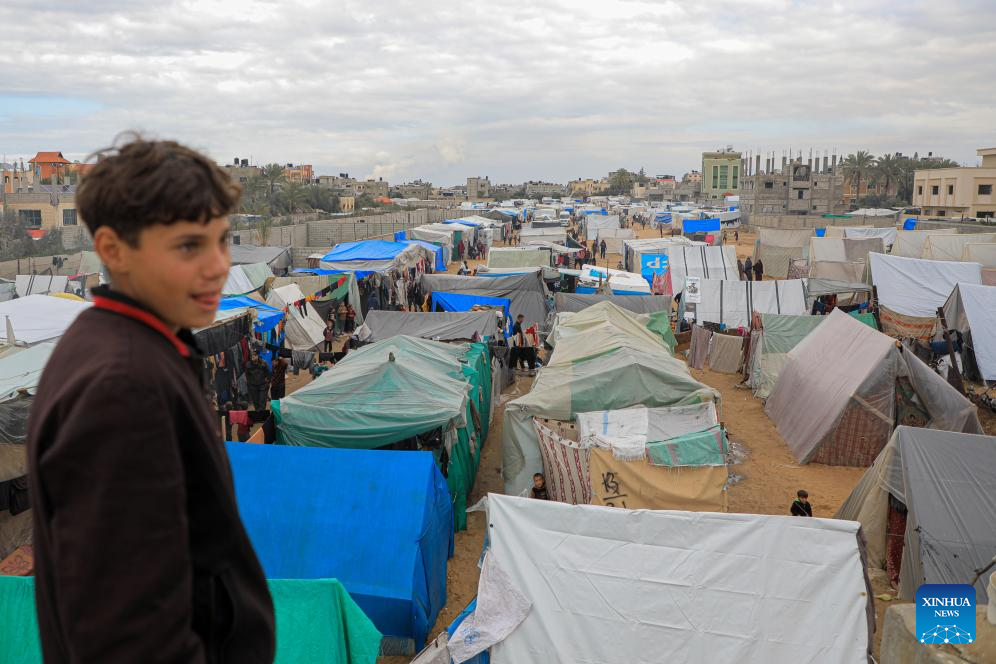
This photo taken on Feb. 18, 2024 shows a view of a temporary camp in the southern Gaza Strip city of Rafah. Rafah, Gaza's southernmost city, shelters more than 1.3 million displaced Palestinians. (Photo by Rizek Abdeljawad/Xinhua)
PARIS, Feb. 19 (Xinhua) -- As Israel keeps expanding its attacks against Gaza, Europe's stance on the ongoing conflict has been changing, with several European countries recently voicing their opposition against Israel's further military actions in the southern part of the coastal enclave, and some European observers even criticizing Israel's patrons in Washington.
Analysts say that Europe's shifting stance has highlighted the transatlantic discordance over the Gaza conflict, which could be explained by the differences in domestic needs and strategic interests of Europe and the United States.
EUROPE VOICES OPPOSITION
In the past week, Israel has launched airstrikes against Gaza's southernmost city Rafah, and indicated that it is set to launch a ground operation in the city, which shelters more than 1.3 million displaced Palestinians.
On Friday, the EU urged the Israeli government not to take military action in Rafah. A military action in Rafah "would worsen an already catastrophic humanitarian situation and prevent the urgently needed provision of basic services and humanitarian assistance," Josep Borrell, the EU's high representative for foreign affairs and security policy, said in a statement.
On the same day, French President Emmanuel Macron, after meeting with Jordan's King Abdullah II in Paris, said that Israel's attack on Rafah could lead to an "unprecedented humanitarian disaster" and become a "turning point in the conflict."
He reiterated that "the only viable solution to meet the security needs of the Israeli people and the legitimate aspirations of the Palestinian people is the effective implementation of the two-state solution."
In a joint letter addressed to European Commission President Ursula von der Leyen on Wednesday, Spanish Prime Minister Pedro Sanchez and his Irish counterpart Leo Varadkar wrote that Israel's military actions in Rafah posed a "grave and imminent threat" and asked the European Commission to undertake an "urgent review" to assess whether Israel was complying with the human rights provisions of the EU-Israel Association Agreement.
Also on Wednesday, while visiting Israel, German Foreign Minister Annalena Baerbock told reporters that "1.3 million people are waiting there (in Rafah) at a very small space. If the Israeli army were to launch an offensive on Rafah under these conditions, it would be a humanitarian catastrophe."
Earlier in February, German Chancellor Olaf Scholz also expressed concerns over the humanitarian situation in Gaza in a phone talk with Israeli Prime Minister Benjamin Netanyahu.
"One of Israel's strongest allies within the (European) bloc" is now "rethinking their unyielding support of Israel's war in Gaza," commented POLITICO Europe.
DIFFERENT TUNE IN U.S.
Since the deadly conflict between Israel and Hamas started four months ago, Europe has shared a similar stance with the United States -- condemning the attacks by Hamas and emphasizing Israel's "right to self-defense."
With tens of thousands of Palestinians killed and the call for a ceasefire growing, both Europe and the United States have adjusted their positions, but to different extents and in different ways.
U.S. President Joe Biden reiterated that Israel should not proceed with military action in Rafah without a "credible and executable plan" to protect Palestinian civilians.
It indicates that if Israel has a plan to protect civilians, the United States will maintain its support for Israel's expanded operations in Gaza, including the attack on Rafah. In fact, the United States has not stopped providing military assistance to Israel.
Such a position has raised questions among the Europeans. "President Biden said this is too much on the top, it is not proportional. Well, if you believe that too many people are being killed, maybe you should provide less arms in order to prevent so many people (from) being killed. Isn't it logical?" asked Borrell at a press conference last week.
Where does Israel expect the Palestinian civilians in Rafah to evacuate to, "to the moon?" he questioned.
European countries, including Ireland, Belgium, Spain, Slovenia, Portugal, Malta, and Luxembourg, are "taking alternative direction to likes of the United States and UK" over Israel's actions in Gaza, noted the Guardian.
"It's an important counterweight against the usual suspects -- the pro-American countries -- who tend to be more pro-Israeli," the British daily quoted Brigitte Herremans, a researcher at the University of Gent, as saying.
DIFFERENT POLITICAL INTERESTS
Analysts believe that Europe and the United States have both adjusted their stances on the conflict for domestic political considerations.
Both sides await important elections. The United States will elect a new host of the White House in November, and new deputies will be elected to sit at the European Parliament in June. They have to consider the feelings of their Muslim communities.
However, the domestic political needs and foreign policy goals of Europe and the United States are not completely the same.
When supporting Israel, Washington expects to gain support from the powerful Jewish lobby groups in the United States, which are financially and politically influential, while the Europeans act out of a sense of guilt over the persecution of Jews in history.
As the civilian casualties and humanitarian crisis caused by Israeli military operations mounted, the United States chose to continue to support Israel with only verbal "warnings," while Europe has been more explicit in its opposition to expanded Israeli military operations.
Besides, Europe is much less in need of Israel strategically, but the United States regards Israel as a pillar of safeguarding Washington's strategic interests in the Middle East.
For Europe, already hard hit by a two-year conflict in Ukraine, Israel's attempts to eliminate Hamas through military action make things harder. Caught "between two wars," "Europe is in danger," Borrell wrote in the French magazine Le Grand Continent in January.
"I believe that Europe should be much more involved in resolving the Israeli-Palestinian conflict. Until now, we have relied too heavily on the United States in the search for a solution to this conflict that directly affects us," Borrell said. ■
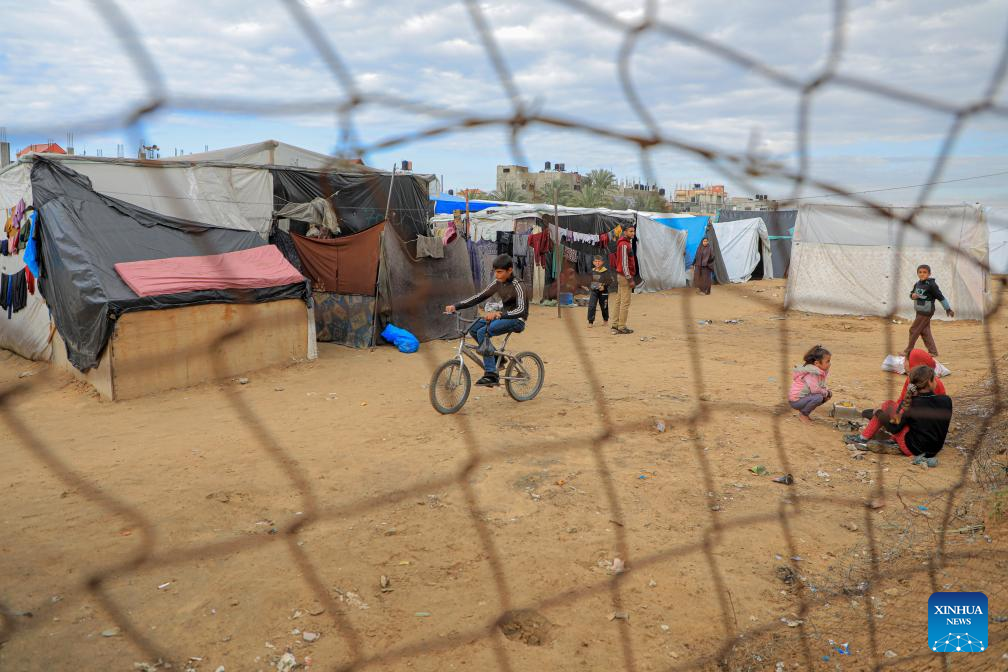
Children are pictured at a temporary camp in the southern Gaza Strip city of Rafah, Feb. 18, 2024. Rafah, Gaza's southernmost city, shelters more than 1.3 million displaced Palestinians. (Photo by Rizek Abdeljawad/Xinhua)
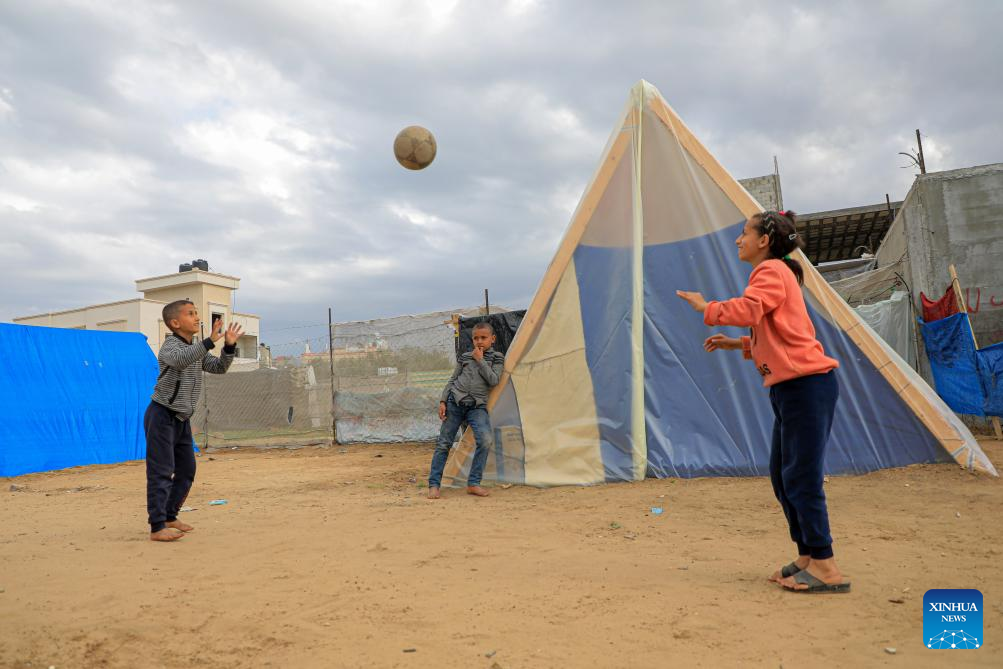
Children play at a temporary camp in the southern Gaza Strip city of Rafah, Feb. 18, 2024. Rafah, Gaza's southernmost city, shelters more than 1.3 million displaced Palestinians. (Photo by Rizek Abdeljawad/Xinhua)
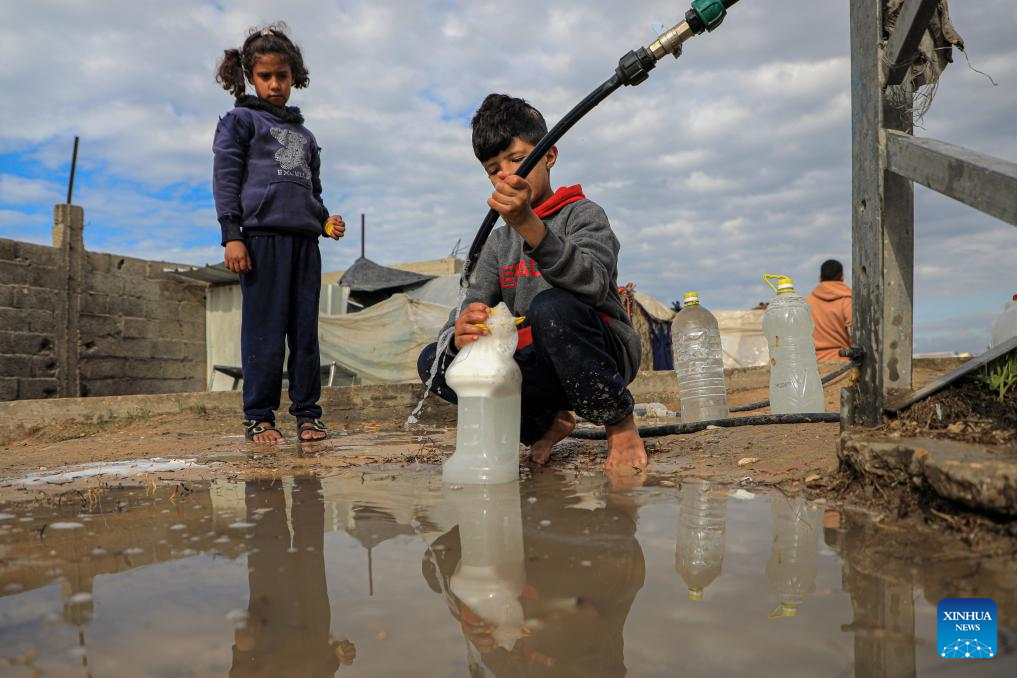
A boy fetches water at a temporary camp in the southern Gaza Strip city of Rafah, Feb. 18, 2024. Rafah, Gaza's southernmost city, shelters more than 1.3 million displaced Palestinians. (Photo by Rizek Abdeljawad/Xinhua)
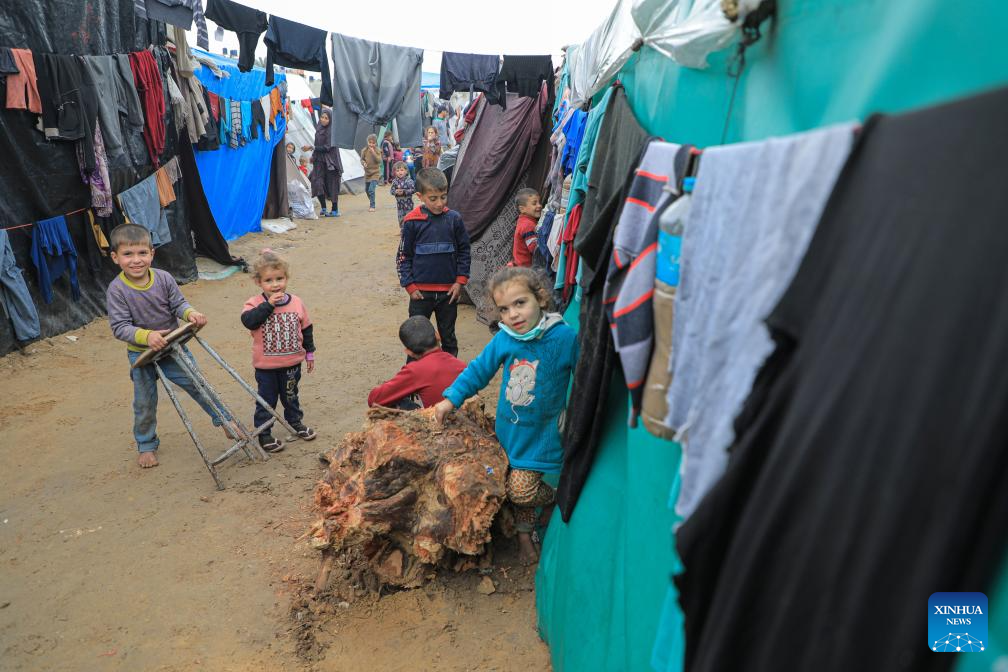
Children are pictured at a temporary camp in the southern Gaza Strip city of Rafah, Feb. 18, 2024. Rafah, Gaza's southernmost city, shelters more than 1.3 million displaced Palestinians. (Photo by Rizek Abdeljawad/Xinhua)



